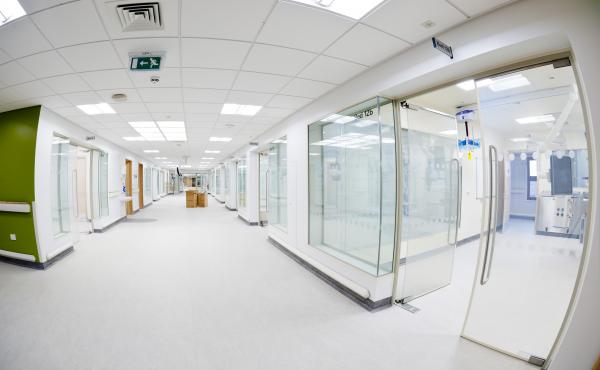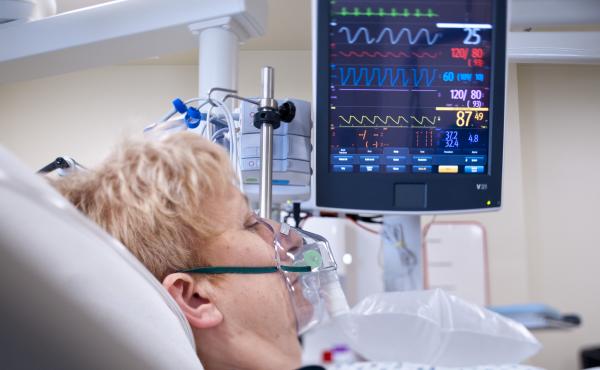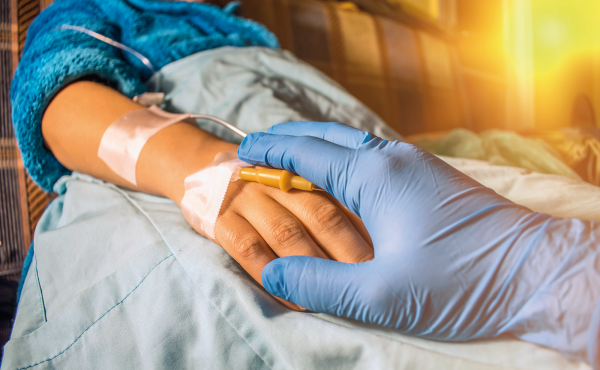Your stay in Intensive Care
Your stay in Intensive Care
Which staff work in Intensive Care?
What happens if I can't make decisions for myself?
Will you ask my family to make decisions about my care?
In Intensive Care you will be looked after by a team of professionals. Our goal is to provide the best possible care and support for our patients and their families.
Intensive Care units have much higher staffing levels than other wards because of the patients we care for. Intensive care nurses look after one, or at the most two patients at a time.
Our medical team is led by our consultants (senior doctors). They formally review all our patients at least 2 times a day, and often more frequently than that. Doctors are always present and a consultant is on duty, day and night.
The team will try and find out from you about any treatments that you would or would not want. Sometimes patients are not able to communicate for themselves. If this is the case for you then the team will always consider any prior wishes or beliefs that you have discussed with your family or close friends. This would include advance decision documents, also called ‘living wills.’
Decisions about ongoing care will always be based on what is best for you. This will include trying to balance the risks and benefits of different treatment options.
Family and friends are very important.
The Intensive care team will regularly update your family and explain the treatment that you are receiving. We are happy to share information with your close friends, but only if this has been agreed by you or your next of kin. The team will ask about whether you have expressed any prior wishes to your family that may be relevant to your current situation.
Some patients admitted to Intensive care struggle to breathe effectively. One of the options that may help is the use of a ventilator. If you need help from a ventilator you will need to be given sedative medicines in order to help you tolerate the tube in your mouth that is used to help deliver this support.
As you get better there will hopefully come a point where you will be able to breathe on your own again. Ventilators have different ways of supporting breathing. This allows patients to be comfortable and conscious before the breathing tube is removed. Sometimes patients require an operation to insert a breathing tube in their necks. This is called a ‘tracheostomy.’ This procedure is performed under a general anaesthetic. This means that patients are not aware during this procedure.
Often patients in intensive care are sedated. There are a number of reasons why patients may need sedation, including if patients require the help of a ventilator.
If you need sedation this is done by giving sedative medicines through an intravenous drip. Your nurses and doctors will alter the level of your sedation in order to keep you comfortable. As you get better the amount of sedation you are receiving will be able to be reduced. This may allow you to do more breathing for yourself.
Sometimes patients need a lot of sedation to allow them to rest and recover. This is more likely in patients who need more support for their breathing, their heart or have a brain injury.
During critical illness vital parts of the body (organs) may stop working. This is serious, but in many situations support can be offered until these organs start working again. This may involve medications, which are usually given through a drip, or machines such as dialysis provided by a kidney machine.
The aim of intensive care is to help people recover as soon as possible. Some, but not all of our patients, may be affected by some long-term side-effects. These effects may last for weeks to months and they include both physical and psychological issues. Specific examples include general weakness, fatigue, muscle loss, memory loss, poor concentration and abnormal memories caused by delirium or hallucinations.
Yes. When it is safe to do so, the whole intensive care team actively encourage patient movement. Mobilisation can help your recovery, including your ability to breathe without help. If you cannot move, the physiotherapy and nursing team can still exercise your arms and legs. This will help stop them getting too stiff and it can even be performed whilst you are receiving sedation. You will be reviewed daily by a member of our physiotherapy team.
Some people who are critically unwell are unable to eat. In this case we will usually give you food by using a small plastic tube which goes through the nose and into the stomach. This is called a ‘nasogastric tube’. In rarer cases liquid food can be given via a drip. As you get better the aim is to get you eating normally as soon as possible. This is an important step in the recovery process.
Most patients admitted to Intensive care are very unwell. If this is the case you will probably need to have a small plastic tube inserted to drain urine from your bladder. This is called a ‘urinary catheter.’ You can still open your bowels when you are unwell but may do this less often than normal. This may seem like an uncomfortable idea but it is normal for you and for the intensive care staff looking after you. In fact, it is an encouraging sign when bowel movements start again.
As you get better you will begin to be able to sit out of bed for a period of time. At this point you will be encouraged and supported in using the toilet as you regain your independence.
Patients who are on a mechanical ventilator or ‘breathing machine’ cannot normally use their voice. This does not mean that you cannot communicate. Staff will continue to talk to you and you may be able to respond by writing, mouthing words or by gestures. Having to rely on these more basic forms of communication is often difficult and frustrating and it can be frightening too. However, it's important to remember that this phase is often temporary and the staff are here to help you communicate.
Staff in Intensive care will always try to explain what is happening to you. If you are very unwell you may be given strong sedative medicines. These medicines may greatly reduce your awareness of your surroundings. Sedative medicines may also reduce your ability to form accurate memories.
Unfortunately, we know that many intensive care patients suffer from sometimes frightening memories of things that did not actually happen. These abnormal memories are called ‘delusions.’ It can sometimes be very difficult to work out what was real and what wasn’t. If you think this has happened to you it is best to speak to someone about it. Some Intensive care units keep patient diaries which may help piece together your experience. Following recovery there is often a chance to visit the Intensive care unit to discuss what happened in more detail and attend an Intensive care follow-up clinic.
Infections are more common in patients in hospital, particularly in those in intensive care. When patients are very unwell it can be harder to fight infections. The Intensive care team will monitor your blood tests and your progress daily. Any evidence of infection will be treated quickly. This is usually effective, but not all infections are easy to treat.
Want to know more?
See our full range of patient resources.



